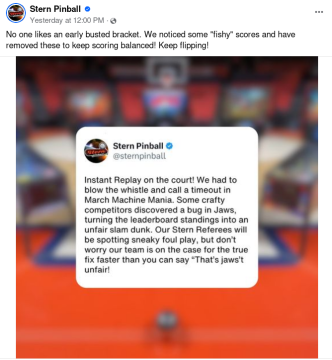I don’t write about pinball much on this blog. That’s actually a good thing, as most of the stuff here is about things that go wrong in the world from my point of view. Sometimes the wrongs aren’t all that egregious but give me a chance to write something semi-humorous, others things go really wrong, and a select few are the real head-scratchers that have me saying “what the actual duck quack?” (Usually with much more bleepable language, of course.) I’m not sure where this one lies on that scale, so I’ll state the facts and my take and leave the judging up to you, the readers.
On March 4, Eric Stone played the new Jaws (LE) pinball live on an internet stream. Stern was, at the time, also running a contest called March Madness. (This is not to be confused with the more widely known NCAA basketball tournament.) The idea behind the contest was that the state with the best players (i.e. highest scores) would win.
Eric, for those of you who do not follow competitive pinball, is a very skilled pinball player. His most notable accomplishment is the 2022 IFPA World Pinball Championship. These are followed closely by a 2022 YEGPIN Match Play championship, a 2024 IFPA Florida State Pinball Championship, as well as two top 20 finishes at the IFPA Open. One does not land those kind of victories without a high level of pinball skill. More importantly, one doesn’t land those kind of victories without being an honest player (i.e. not cheating). Perhaps the latter of these two is even more relevant to the circumstances.
On the night in question Eric put up a mind-blowing score of 4 trillion on this Jaws pinball (see video). For reference, most players consider one billion to be very good score, with my personal best being a paltry 144 million and change. To be fair I have not played this particular title nearly as much as Eric has. The controversy comes from how Eric got to this score.
If you go to 32:35 in the video, Eric has caught all four sharks. He then starts spamming (repeatedly shooting) the spinner. This, in the game’s current state, scores millions of points per spinner tick. The high scoring is likely due to a bug in Stern’s code. Note that it’s incredibly difficult to get to this point. It’s certainly not something even most wizard-level players can do easily.
When he gets to the point where he can make the high-scoring spinner shots, Eric’s score isn’t too far over 1 billion. Obviously, Eric will score big and skyrocket his score geometrically by the end of the game. The 4 trillion score would (temporarily) put Florida in the lead in the March Madness contest.
Temporarily. That is, until Stern decided to disqualify it. That’s bad enough but the social media posts from Stern imply that Eric cheated, using words like “fishy”, “unfair”, and “foul play”:

My take on all this: you really can’t fault Eric for playing the game as Stern shipped it. Everyone has the same (presumably defective) code on their respective Jaws pinball machines. The game was on video. We, the pinball players and fans all over the world, can all see what happened. Most importantly, we can see that Eric did not cheat. Stern’s bad code is Stern’s fault, not Eric’s. The right thing for Stern to do was fix the code going forward, starting with the next round of the contest, letting the current scores stand.
To his credit, Eric handled this rather gracefully, acknowledging that he “didn’t get [the score] the way [Stern] wanted it” among other things, but also emphasizing the score was “earned”. That, honestly, is remarkable composure in the face of a very thinly veiled accusation of cheating. A lot of people would take such an accusation personally, myself included.
